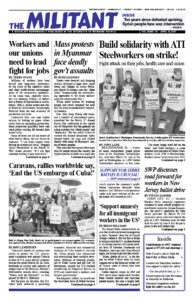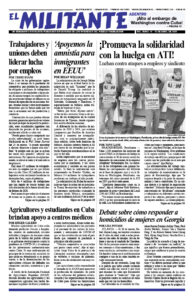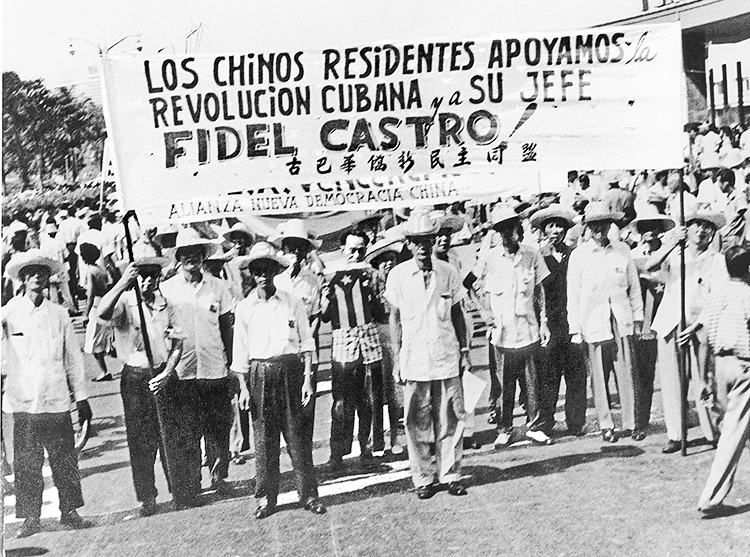Our History Is Still Being Written: The Story of Three Chinese Cuban Generals in the Cuban Revolution by Armando Choy, Gustavo Chui and Moisés Sío Wong, is one of Pathfinder’s Books of the Month for April. It covers how these three rebels of Chinese Cuban ancestry rose to be generals in Cuba’s Revolutionary Armed Forces. And it shows how the brutal exploitation faced by Chinese Cubans under capitalist rule in Cuba led to their “unblemished record of combat” in a century of revolutionary struggles that culminated in the overthrow of the U.S.-backed Batista regime in 1959. It ranges from the history of Chinese immigration to the experiences of the three in internationalist revolutionary action over decades. These interviews from 2002 to 2005 were by Mary-Alice Waters, who edited the book, and other Socialist Workers Party members. The excerpt is from Waters’ introduction. Copyright © 2005 by Pathfinder Press. Reprinted by permission.
Armando Choy, Gustavo Chui, and Moisés Sío Wong, three young rebels of Chinese Cuban ancestry, became combatants in the clandestine struggle and 1956-58 revolutionary war that brought down the US-backed dictatorship of Fulgencio Batista and opened the door to socialist revolution in the Americas. Each, in the course of a lifetime of revolutionary action, became a general in the Revolutionary Armed Forces of Cuba. Through their stories the economic, social, and political forces that gave birth to the Cuban nation and still shape our epoch unfold.
We see how millions of ordinary human beings like them — the “men and women from nowhere” who the rulers cannot even see — simply refused to accept a future without dignity or hope, refused to settle for less than they dreamed of. They marched onto the stage of history and changed its course, becoming different human beings themselves in the process. …
The three young Chinese Cubans, of similar age, grew up in different parts of Cuba, under different class and social conditions. With each following his own path, all three came to the same revolutionary course of action. They threw themselves into the great proletarian battle that defined their generation — the struggle to overthrow the Batista tyranny and defend Cuba’s sovereignty and independence against the onslaught of the imperialist empire to the north.
The significance and historical weight of Chinese immigration to Cuba starting in the mid-nineteenth century emerges from their accounts. In proportion to population, this immigration to Cuba was greater than anywhere else in the Americas, the United States included. In fact, thousands of Chinese laborers brought to build railroads in the US West later emigrated to Cuba in hopes of finding better conditions of life and work.
The lucrative trafficking in tens upon tens of thousands of Chinese peasants — their impressment, their death-ship transport to Cuba, their indentured labor on sugar plantations supplementing the dwindling supply of African slaves, and above all their resistance, struggles, and unblemished record of combat in Cuba’s 1868–98 independence wars against Spain — all that is sketched here in broad outlines. It is a story largely unknown outside Cuba.
What is presented here, however, is not history alone. This is one of the indispensable strands of revolutionary Cuba today. From the pre-1959 racist oppression and superexploitation of Chinese as well as black labor, to the measures taken by the popular revolutionary government headed by Fidel Castro to end this discrimination and combat its legacy, to the integration of Cubans of Chinese origin into every level of social and political life today, the story unfolds. As Sío Wong puts it so forcefully, the greatest measure taken against discrimination “was the revolution itself.”
“The Chinese community here in Cuba is different from Peru, Brazil, Argentina, or Canada,” he emphasizes. “And that difference is the triumph of a socialist revolution.”
The revolutionary overthrow of the Batista dictatorship on January 1, 1959, was not the end of a story. It was the beginning. After taking power, the working people of Cuba began building a new society that posed an intolerable “affront” to the prerogatives of capital. For more than half a century they have defended that society built on new foundations, holding at bay the strongest imperialist power that will ever stalk the globe. In doing so the Cuban toilers and their government have become a beacon, and an ally, to those the world over seeking to learn how to fight to transform their lives — and how to fight to win.
Among the many responsibilities Choy, Chui, and Sío Wong have each shouldered over the years — within the Revolutionary Armed Forces as well as in government assignments and in the leadership of the Communist Party of Cuba — participation in Cuba’s internationalist missions abroad stands out.
“Because our system is socialist in character and commitment,” Choy explains, revolutionaries in Cuba have always sought to act “in the interests of the majority of humanity inhabiting planet earth — not on behalf of narrow individual interests, or even simply Cuba’s national interests.”
Each served in Angola at various times between 1975 and 1988, as Cuba responded to the request of the Angolan government, just gaining independence from Portugal, for aid to defeat an imperialist-backed invasion by the armed forces of South Africa’s apartheid regime.
Chui helped establish Cuba’s internationalist military aid missions in Nicaragua, Ethiopia, and Mozambique. Choy served as ambassador to Cape Verde from 1986 to 1992. Sío Wong in 2003 helped Venezuela’s toilers in their efforts to establish and extend small-scale urban agriculture. From 1992 to 2010 he served as president of the Cuba-China Friendship Association. …
As each of the three generals makes clear, the future will be written not for the working people of Cuba, but by them.


